Sometimes in life, when your mundane routine begins to suffocate you, the need to shift gears becomes inescapable. It’s hard to get out of a rut and easy to be stuck in a hamster wheel—for Knoxville’s Tyler Anthony, the chief force behind freak-folk project Cereus Bright, the latter was very much the case. Despite a decade-long oeuvre under his belt, the project has become more of a solo moniker following the absence of a live line-up and ceasing touring. Anthony’s pragmatism led him to believe music was behind him; he was prepared to wind down. That is, until a long-time musical friend encouraged him to move to Mexico City and help him establish a recording studio.
Anthony described the experience as one of “the wildest, hardest, and most exciting I’ve ever had,” which came from taking the risk of sacrificing stability, his desk job, for his passion in the arts—he couldn’t be more thrilled about making that choice. The rewarding upheaval is captured on the latest Cereus Bright record, ANYTHING—an immersive, psychedelic, and existential body of work that explores the unknowing of where life will take you and being content with that. It mirrors Anthony’s own journey of unexpectedly reabsorbing himself with an art community and music, reinvigorated to create so much more.
The Cereus Bright flower is white, but for the first time, it’s variegated with splashes of vibrant color, indicative of the multilayered, intimate, and at times rapturous songs collected on his sprawling new full-length. That newfound confidence is a triumph, but Anthony is importantly at peace with life’s uncertainty and believes people can dream beyond its mundanity. “If you’re chasing a fanciful ambition, I hope you feel like it’s okay to be grounded at times,” he said. Anything is possible if you put your mind to it—that’s what Anthony hopes you’ll do. Just say the word.
In our extensive and inspiring conversation, Anthony discussed the philosophical themes of navigating ordinary existence that underscore the record, the influence of his Mexico City move, and shared invaluable nuggets of creative advice.
The first thing I want to touch on is how you said your previous record, GIVE ME TIME, was quite personal and intimate, but with the new album, ANYTHING, you’ve explored bigger and more abstract ideas. Could you elaborate further on that?
Tyler Anthony: Cereus Bright was a five person touring act for maybe 10 years. There’s something that happens when you’re touring and playing a lot of shows. The music you write starts to direct itself towards that. Once that chapter of Cereus Bright concluded and became more like a moniker, I reabsorbed it. I had all of these quiet, intimate songs I had been storing up, which is what GIVE ME TIME was: a way for me to explore myself, my past, and more personal sides of me because it was just me again.
Writing a lot of those songs in my late 20s or early 30s, I think that was where I was on my personal journey of becoming an adult and investigating who I was, where did I come from, how did I get here, you know? Not that this process is always linear, but I think after that on a creative level, I was wondering what’s next. I started to look up and around, towards the future, and feel what a lot of people feel, which is varying degrees of anxiety and dread, or uncertainty of time and the future. For better or worse, I find myself being a pretty philosophical person, so a lot of these songs were an attempt for me to explore those ideas or articulate those feelings.
Also, I think the older I get, the stuff I find myself thinking about isn’t necessarily like a love song. There’s things I wrote when I was younger, which I think are fun, great, and I love, but I find myself now looking to the horizon and wondering what’s next in my life for the world and beyond. Not that every song [on ANYTHING] is that heady and existential, but quite a lot of them are. I think that’s the sort of headspace I was in when I was writing them.
I’ve been able to sit with ANYTHING for a while, and even compositionally, it’s more expansive, layered, and maybe urgent than your other music. You can hear those explorative notions in the songs. Did that come from those notions like you said, or your whole move to Mexico City?
TA: Well, first, thank you for listening closely. I’m happy that it showed up sonically. As I’ve grown as an artist and musician, it’s more and more important to me that there’s an alignment of the sonic world in conversation with the thematic lyrical world, or those things can be played with as components.
And you’re certainly right. It’s funny, I wrote and recorded all these songs before I moved to Mexico, so it’s funny to look back on them because I like that you use the word “urgency”—that was obviously happening, right? There was some part of me that was feeling pretty cooped up. Probably five or six years ago now, I stopped touring full-time and doing music is hard. So, I got a desk job working in marketing for a software company, and living in Knoxville, Tennessee. It was the smart, pragmatic thing to do, but I was feeling some deterioration of self and creativity. It’s funny to see these things show up in the songs, probably unsurprisingly.
I wrote and recorded this album on nights and weekends, tracking the backbone of maybe nine songs over three days. It was crazy. Obviously, something was building. That culminated in me reconnecting with an old musical pal I had toured with years ago. He had been living down [in Mexico City] for a year or so, and was working on this project called Casa de Copas. It’s a recording studio, but it’ll hopefully grow to have more expansive, community-centric things. For both of us, it’s another chapter of trying to be hopeful and honoring those parts of us that are creative and artistic and… I don’t want to say “being masters of our own fate,” but to not give up and be stuck on a hamster wheel. So, after talking with him about the main feeling of this project, he was like, “Dude, you should come down and help out.” Fuck… The existential cat was slipping out of the bag pretty fast. Almost immediately after him saying that, there was a big dose of realization of how disconnected I was from myself and who I want to be. That was the fuel to push me into this move.
I imagine by trying to absorb yourself in your passions lie, but having to put away stability, there’s a big risk involved.
TA: Yeah. Brother, I’m feeling it, I’m in the middle of it. *laughs* It’s not resolved. I’m still in free fall in a lot of ways, but the freedom and relief from the existential dread has been enormously important. Not to be too grandiose about it, but it’s trying to step towards something that feels life-giving. I want the world to be a place where artists can still move towards those parts of themselves, right? And so, there’s a version of me trying to access what I preach and be like, “Okay, however naive or risky this is, I am going to move towards this part of myself and see where we go from here.” I’d rather try to live a life like that, and then pick up the pieces if I need to.
I think that’s really beautiful to still pursue that artistic route. That whole thing of wanting to live and carve out a space where artists can indulge in their practice and still be afloat. In my own creative practice, it’s something I also wish could easily exist. Even though it’s probably been stressful, I assume it’s been rewarding to get involved in that communal artistic culture?
TA: Yeah, it’s been really meaningful. Before the move, I could see the trajectory of my life becoming less connected to the parts of myself that were expressing and creating. Certainly in the last few years, I had many moments thinking, “Maybe this chapter is done. Maybe the music part in me is done because it’s so hard or it’s in such opposition to the other pragmatics of life.”
So, to have this mood and be resubmerged in it all in a deeper, denser way than I’ve ever been before, is really exciting and refreshing. It makes me very grateful. Like, the world’s very, very big. There’s a lot of people doing shit that’s cool. I mean, Mexico City is enormous, it’s a huge city and there’s so many people here doing cool shit. That’s so refreshing because it’s not about them doing it because everyone thinks they’re super special or they’re gonna get famous. It’s just like, people, artists, and creatives do this—they’ve always done that, you know? I’ve been very thankful to be exposed to and energized by that. It makes me think, “Oh yeah, I can fucking make music for the rest of my life.”
That’s awesome. Where I’m at in Melbourne, there’s a lot of local stuff happening, even if they’re not necessarily looking for fame. People around my age—I’m 21—they’re balancing their normal lives and carving out their own spaces as well. So, with ANYTHING having already been recorded, has the move to Mexico City and seeing its bustling artistry influenced your perspective on how you see that album?
TA: Yeah, like we were talking about on the surface: being able to look at it and see this move as a conclusion of a lot of the musings and energy of the last however many years.
There may be two parts of what you were like thinking, which I find really interesting. One is in terms of carving out a space. I think it’s really hard for modern artists—I don’t have to tell you this—but there can be some camaraderie about remembering how hard and weird it is. The modern music landscape is tremendously challenging. People use words like “saturated,” but more shit than ever is being made, and that’s cool. If anything, maybe there’s a return to something a little bit more pure.
I was having a conversation with a friend yesterday and was, like, “If I remove money and fame from the equation, I only wanna do this if it’s fun, I’m doing it with people I like, and I’m really proud of the thing I’m doing.” With this album, they were the core motivators. It’s like, I’m fucking 35, I’m not gonna be famous, I know what I am now and I’m okay with that. So, instead of dialoguing with some potential viral slot machine in my brain, I can try to dialogue with the process. That’s getting some of my favorite musicians to come in and work on this thing together, get everybody’s fingerprints on it, and make something that we’re all proud of and do our best to share it. What sucks is when you compromise the process for the sake of trying to be fucking famous and something in there doesn’t work. You’re like, “Well, fuck! None of this was good.”
Yeah, it becomes discouraging when you know your vision comes first and you’re steadfast in what you want to do, but it’s hard to get out of that bubble of, “Oh, there wasn’t much reception to all this hard effort I put in.” But at the end of the day, when you have someone else say, “Well, you made this, you’ve been able to do this,” that’s an achievement in itself.
TA: Some of my biggest hallmarks are the musicians I respect who were involved and proud of [the album]. I fucking love you guys, and if you are posting about it like, “It ruled, I loved being part of it,” hell yeah—that’s a huge win for me.
Even returning to what I was saying, like the second half of your question of this experience in Mexico City and how it makes me think about the record, being here has reminded me of how big the world is in terms of how many artists there are. It’s so easy to get stuck in your own little bubble and compare yourself to others, but it’s just, I don’t know… It’s just so big, there’s so many people. It’s a constant reminder to take myself out of the world of comparison and measurement because there’s so many factors at play and things that can control, and that’s a losing game.
I’m trying to let it go. And it’s been fun to meet new people here and share the music and have new friends be like, “This is cool and amazing!” And I get to hear their music, thinking, “Holy shit, we would have never known of each other and this music six months ago. Now we do, and that’s really cool.” I’m trying to celebrate the beautiful parts of all of that and the connections that are being made, as opposed to checking the Spotify numbers every day and measuring my own worth.
It seems like this body of work and everything surrounding it is trying to navigate following your ambition, but also being grounded with ordinary existence.
TA: Yeah, yeah, one hundred percent. I think that can look a lot of different ways. Maybe my initial understanding of being “grounded” was a sense of: “Here’s my ‘ordinary life,’ I need to be thankful for it, but how do I settle into it and accept it?” Some of that was maybe me trying to convince myself to do that, which I think sometimes is the right choice and other times it’s not. I think there is a relationship to seeking, searching, and wondering, and I don’t know if this is the opposite in the spectrum we’re talking about, but accepting, settling, and grounding too.
If I have any firm statement, it’s to say: I don’t know. I’m not interested in absolutes, I’m not interested in final arrival points, and I think those things are inherently in flux, in fluid, and in motion. The hardest thing is staying adrift in those things. I think it’s the right thing to remain in a balancing act of looking out and in all directions at once—that’s hard, it takes energy and attention. I think for me, it cultivates presence and here-ness, whereas if I get too lost in the infinite or too obsessed in the present with the details, I’m missing something that the other offers, you know?
Yeah, like boxing yourself in, maybe? If you obsess too much, it’s hard to stay on your feet.
TA: Exactly. I grew up pretty religious and whether people are religious or not, there’s an obvious human desire to make sense of things, to find meaning, and even a step further to sort of codify that meaning to say, “This is how the world works; This is what’s right or wrong; This is the right way to be, the wrong way to be,” it’s a tale as old as time. Whether people find that in religion or they find it on a YouTube channel, there’s a constant search for that. I don’t think that desire is bad, but I think that sometimes it’s a rival in a certain place. Like you said, it can be limiting and even dangerous, right? So much of my life, especially in this chapter, is defined by just what you said: Trying to stay in-between, as uncomfortable as it can be because it allows me to remain open, curious, and wondering.
That’s really fascinating, I love that. On the music itself, with other people on the record coming together, did that have an influence?
TA: One hundred percent. Actually, it’s funny, what I was just describing as a posture towards life was also a posture towards the music. So, rewinding again to past records like GIVE ME TIME for example, I w as pretty focused on what I wanted and felt like it had to represent me fully. Like, “Oh, I’m an indie and folky songwriter and here’s my sound.” I came into this project way more interested in openness and collaboration, so the process of recording these songs was pretty open-handed. I brought a bunch of musicians from Nashville up to Knoxville where I was living, and showed them like nine songs for that first session which they’d never heard before. We would talk about them and I would say what the song meant to me, the tonal feelings I had, and let the guys interpret its emotion and spirit. We went in there and laid down the skeletons of these songs across those three and a half days and got to move fast and not overthink it.
It was tremendously freeing. I mean, it’s scary too because you want to get it right—but not to be too heady—there’s this feeling of “What’s right?” If this feels cool, let’s let this be the thing and enjoy it, then move on to the next song and enjoy it. That was so refreshing. I love how that even bakes a little bit of the thematic posture into the sonic process. It was important to me, like I said earlier, that everyone felt like they had their fingerprints on it. I would only raise my hand going “I don’t know” once in awhile, or like, “I fucking love this! Yes, let’s head in that direction.” So much of it was just trust and creation. The whole sonic landscape belongs to everybody, which I’m happy to say.
That’s fantastic because it translates as quite a communal body of work because of how many fingerprints have touched it. With that happening and you being involved in Mexico City, just for the Cereus Bright project itself, what’s next for the future? Can you see yourself collaborating with some of the musicians you’ve met or tour again?
TA: Yeah, I’m able to start dreaming again. By being here in this community and location, I could sit off the hamster wheel that I felt like I was on, which is really exciting. So, yes to all those things. Just meeting people also dreaming and scheming to work on stuff together, from the States or beyond here. I’ve actually already had a few Australians come through and I think it’s really beautiful. I don’t want to get too heady—though I always do—I think to me, the most exciting vision of the future for everyone is that all people in all societies become more interconnected, excited, and generous about each other’s history, culture, skills, and creativity. There’s versions of culture sharing that are appropriative and predatory, and there’s versions of sharing that are beautiful, expansive, and important. In Mexico City, it’s such a blueprint for the latter because it’s such an international city. There’s so many cultures and so much history that I had no idea about. People from all over the world have come here for hundreds of thousands of years—sometimes good, sometimes bad—but in the end, it’s a lot of amazing people converging.
That’s what’s most exciting to me: Even in a small way, being a place in the world where that can happen musically, but also culturally and creatively, on a human level. It’s the ways in which you connect with, meet, create with people that are different from yourself. How helpful and meaningful it is to expand your own sense of self, your view of the world, expose your ego, self-centeredness, or cultural-centeredness. I’m excited for what the Cereus Bright project can do because I think it’s only going to become more collaborative and expansive, and it’s not just about me. Kind of per our earlier conversation, I’m happy to report that I have no illusions of grandeur. *laughs* So, it’s more like, “Let’s just fucking make some cool shit.” There’s no rules, create with whoever you want, call it whatever you want, put out whatever you want. That’s what’s beautiful. It really feels like there’s a bunch of wide-open doors which I’m tremendously thankful for and excited for where that journey will lead.
You, as a working musician, by being able to be completely absorbed into that artistic collaboration, I imagine it’s so freeing. Diving into all of these different creatives you never would’ve found or heard, just getting out of your comfort zone as a way to expand it. That’s how it comes across to me.
TA: Yeah. It’s happening, and I’m excited for more to come. It’s only the beginning.
Are there any standout songs on the record that immediately jump out at you? For me, sonically, “Seven Wonders” and “Ride” really stood out on first listen, almost like triumphs in your discography.
TA: “Seven Wonders” was a song that I started seven or eight years ago and it sat on a shelf, I never knew if it was going anywhere. It’s funny how songs stick around. Some of it is, like, “Okay, I’m gonna honor this song, I can’t shake it, so let me finish it and see what it wants to tell me.” It was one of those and I’m glad I did. I wanted a lot of the songs to be a little bit more abstract, kind of cosmically, existentially, and sometimes archetypal. I’m a big fantasy nerd, so, I wanted the edges of it to even feel fantastical, as a contrast to the hyperpersonal storytelling songs of the past. On a production level, “Seven Wonders” was really important to throw everything at it. It’s an obvious investigation into these philosophical ideas and was very fun to head into that territory in ways I hadn’t really gotten to before, taking inspiration from Sufjan Stevens or just that robust, lush, orchestral production. I hoped to mimic the weird modern soup of living in modernity and the sounds, feelings, and overlaying dynamics of being a modern human.
I think “Ride” is as rock and roll as the album gets. As far as the theme goes, it’s sort of a triumph. It was one of the last ones we recorded, so it’s fun when you have a whole album out in front of you like, “Cool, we have some space over here to go a little heavier.” I could let my electric guitarist go a little harder and it suited this song.
That’s why I love albums—they give you permission to view a collection of songs and contexts and allow you to be more specific. If I were to take each song on its own, I’d be asking, “Does this sound like me? Is this a single?” Instead, I can be like, “Hell yeah, here it all is. We can go soft on this one, and loud on this one.”
I also want to touch on the song “Boys” because the lyrics involve stories of two different people: One of your wife’s father and your grandfather, piecing together a narrative from other people’s lived experiences. That song stood out because compared to the album’s mystical and abstract elements, it pulls you back down to reality by integrating other people’s lives in that. What can you say about that one?
TA: I think you’re absolutely right. That song started as an investigation, or I heard stories of exactly what you just said: My wife’s dad and my grandfather being sent to boarding schools. My grandfather in particular was sent at a very young age, maybe like three or four. He was also especially a very complicated guy—to put it nicely—he was not a good dude and did not treat people well, and caused a lot of hurt and trauma to my mom, especially the rest of the family and whatnot.
I heard the stories later of the boarding school, so it’s always interesting when there’s someone you’ve filed as bad, and then you hear more about it, you’re like, “Well, man, that sucks too.” I don’t know how I would have come out of that situation and it’s not to excuse it, but it actually makes it more complicated and nuanced.
I started there but expanded out and started to think about those themes beyond a personal level, but on an institutional level, where there’s plenty of things that hurt or oppress us. It’s tempting to say, “Those things are all bad, fuck them, tear it all down.” I think there’s plenty of times where that’s appropriate, but the harder reality is when those things didn’t mean to, whether that’s a person or institution, if there’s good intentions, or the person or entity themselves is broken or fallible, which in fact we find out everything and everyone is.
It drifts from the hyperspecific into the larger, more macro for me in the same ways of who’s the good guy and who’s the bad guy. Is it that simple? Especially in the chorus, it paints the scene of maybe a parent or someone being pretty conditional with their love, but also self-aware of being imperfect. Again, the older I get, the more I experience stuff and the more life feels like I don’t know what box to put things in and being okay with that. Like you were saying earlier, both things can be true. Sometimes, this person hurt me and this person loved me. I don’t know what to do with that, but that’s just how it goes.
So, it’s a really meaningful song, and I’m such a lyric guy. Even as I was exploring stuff less familiar to me from being more abstract, to have a song like that in the mix where I focused on more close, personal storytelling. I wanted that in the equation as a foil to the big mess. Even in the tracklist, I put that right after “Seven Wonders” because it’s like you’re zoomed out and you get right in, just to show the edges of the record in some ways.
With everything that’s happened, did you expect to still be engaging with music, or being a musician in the first place? Particularly in such a communal way.
TA: Not a bit. The GIVE ME TIME record was hard for me to make because I already stopped working full time and stopped touring with the band that I’d been playing with for 10 years. It was really a scary, vulnerable step for me because I had been able to lean on all these other guys for so long. Maybe in some ways I’d been hidden behind some of their decision making. It felt really overwhelming.
So, I was super thankful to release that record but was also fully prepared to be winding down in some ways. Maybe I’d write a little bit, but get more local and small. And then I got reached out to out of the blue by the Canadian label Nettwerk a couple years ago, and they were like, “Hey, we love your music and we’d love to chat with you about working together.” It blew my mind. I was like, “Are you guys sure? Because I’m not touring and this is who I am.” Then they were like, “No, you do you. We work with all sorts of people.” So, I’m really thankful for that because it completely opened up a whole other chapter of this. It allowed me to go into this record to be even more ambitious sonically, which is really fun because I never would have been able to do that without the support.
It’s amazing how even that step into this record was keeping some part of me, some sparks alive that certainly moved me into this season of new. I mean, there’s a world without that reach out. I would have just gotten more and more insular and maybe stayed in Tennessee and never really had this kind of hunger. I’m really thankful for that and I’m a big advocate for music and artistry looking a lot of different ways—that was something that was hard for me for a long time because a lot of times we imagine musicians can be kind of one dimensional. It’s like one person has to tour all the time and it’s their whole career. What I’ve sadly found is there’s a whole group of people that are like, “Oh, I can’t be that, so I’m just going to stop.” Anytime I can, I want to jump up to the mountaintops and call out to artists of all kinds, but especially musicians, saying, “Hey! There’s a lot of ways to do this, and don’t let, ‘Oh, I have to quit my job to do this,’ be the only metric for whether you should do it or not.”
I want there to be musicians and artists across all walks of life and writing from all perspectives. That was something I even found with this record where I was writing and creating from on the grid. I was working the nine to five, I was in suburbia at the desk. There’s things I’m feeling that are going to be different than a touring artist. I have a perspective now, and I want to respond to it and get art from all sorts of people with all sorts of different viewpoints, not just the ones on the road doing it formally. That’s my encouragement to anyone to find a way to create and share, whether it’s big or small. It’s all important.
Do you have anything else you want to add?
TA: Thank you for the space and the questions. It was great to chat about it. The last little bit to lay in my philosophical plane is talking about the album title, “anything,” and the end of the album. In the outro of the very last song, “Don’t You Fake It Too,” there’s a little call to action and it’s ambiguous if it’s to you, to us, to future generations, or whatever. To me, that’s a point that comes after deconstruction when you’ve been jaded or given up on the world or future, and there’s a cynical nihilistic cloud that can settle over us. It’s like, nothing matters, nothing’s gonna get better, we’re all doomed. It’s easy to become pretty negative or hedonistic in those spaces, which I don’t fault anyone for. But for me, having lived in some of those modes, it’s ultimately unsatisfying and not the life I want to live. Whether it’s naive or blind, I’d rather live with a level of optimism and it’s not a certainty that everything’s gonna be okay. It’s more like I’d rather try to help it be okay. Let’s go from here, let’s do what we can, let’s build what we can, and do our best. There’s an invitation into that posture.
Even the album ANYTHING is, like, take anything you can find, do anything you can, like anything you can, like… anything! Like I was saying earlier, I’m not interested in the right or the wrong way, but do anything, do something. That’s as much as I want from myself and from each other. My dad was a pastor, so I grew up listening to sermons my whole life. Maybe there’s some pastor kid part of me that wants to make a point—if I am, that’s it. There’s a little invitation in there. That’s the root of it. After all those musings, look to the future and keep going.
You can check out ANYTHING on Bandcamp, and follow Cereus Bright for updates over on Instagram


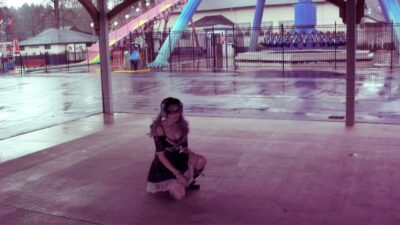

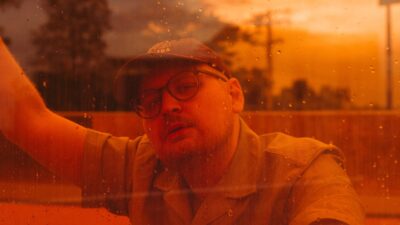
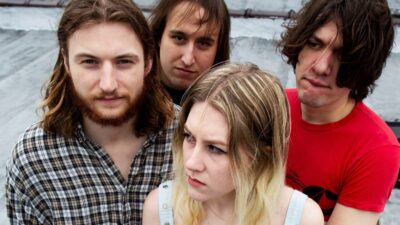

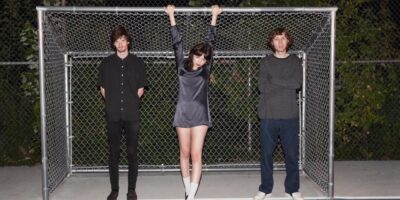

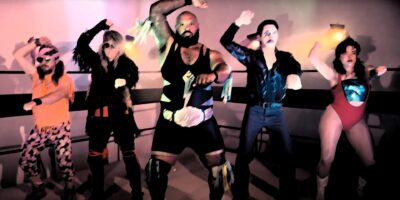
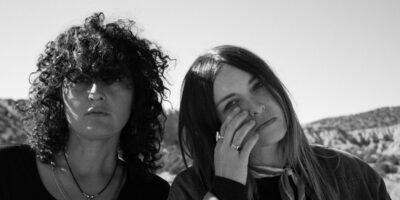





Comments